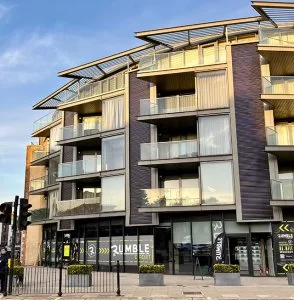The Renters Reform Bill

Contact
Table of Contents
A Review of the Renters Reform Bill
The 2019 Conservative Manifesto made a commitment to end “no fault evictions”. This has not been set out in the proposed Renters (Reform) Bill. The Bill was introduced to Parliament on 17th May 2023 and is currently in the House of Lord due its second reading.
In this article we look at the impact that the proposed Bill on landlord and tenants and a private landlord’s ability to obtain possession of their property from a tenant.
Removal of Section 21 Notices
Under the current legislation most tenancy agreements granted within the private sector are “Assured Shorthold Tenancies”. Tenants are granted an initial fixed term (minimum 6 months) after which their tenancies become “monthly periodic tenancies ”, meaning their tenancy rolls on month to month until it is ended by the tenant or the landlord serving notice.
Where a tenant occupies a property under an Assured Shorthold Tenancy, and the fixed term has ended, the landlord is entitled to serve the tenant with a Section 21 Notice providing them with 2 months in which to vacate the property, failing which the landlord is entitled to issue possession proceedings. The landlord does not need to prove any fault on the part of the tenant to obtain possession under a Section 21 Notice (or any reason at all), which is why these have often been referred to as “no fault evictions”.
The Bill abolishes Assured Shorthold Tenancies and Section 21 Notices. It will no longer be possible for a landlord to agree a fixed term with a tenant and all tenancies will be assured monthly periodic tenancies. The effect of the Bill is that a tenant will have “security of tenure” insofar as a landlord will not be able to evict them unless they can persuade a court as to why they need their property back, details of which we look at below.
Section 8 Notices
A landlord is entitled to evict its tenant provided one of the grounds set out in Schedule 2 Housing Act 1988 is satisfied. The landlord serves the tenant with a “section 8 notice” (due to a desire to change its use or there’s been a breach of the tenancy agreement) setting out the ground it relies on and if the tenant does not vacate, the landlord is entitled to issue possession proceedings. Some grounds are mandatory (if the ground is satisfied, a Court has to order possession) and some are discretionary (the Court has discretion as to whether to order possession regardless of whether the ground is satisfied).
Under the current legislation this process has largely been used in relation to rent arrears. Ground 8 for example makes it mandatory for a Court to grant a landlord possession if the tenant is more than 2 months in arrears.
To compensate landlords for the abolishment of Section 21 Notices the Bill introduces several new grounds into Schedule 2 Housing Act 1988 under which a landlord would be entitled to its property back. It also amends several existing grounds. We look below at the most relevant of these new (or amended) grounds.
Ground 1 – Occupation by landlord or a family member of the landlord – Mandatory Ground – 2 Months’ Notice
If a landlord (or a family member) wishes to occupy a property let to a tenant, the landlord is entitled to serve the tenant with 2 months’ notice stating its intention to reside in the Property. If the tenant refuses to vacate the landlord would be required to issue possession proceedings and, provided the Court is satisfied that the landlord (or its family member) has an intention to reside in the property, the Court must grant possession.
Ground 1A – Sale of the Property – Mandatory Ground – 2 Months’ Notice
If the landlord intends to sell the property it will be entitled to serve a tenant with 2 months’ notice stating its intention to sell the property. If the tenant refuses to leave the landlord would be required to issue court proceedings and, provided the Court is satisfied that the landlord intends to sell the property, the Court must grant possession.
Ground 8 (Amended) – Repeated Rent Arrears – Mandatory Ground – 4 Weeks Notice
Where, over a 3-year period, at least 2 months rent was unpaid for at least a day on three separate occasions and rent is payable monthly, the Court must grant possession.
Ground 14 (Amended) – Anti-Social Behaviour – Discretionary – No Notice Period
The definition of anti-social behaviour is to be widened to include behaviours capable of causing nuisance of annoyance. The notice period is also shortened to allow a landlord to issue proceedings for anti-social behaviour immediately on serving notice on the tenant. This ground is discretionary and thus it will be up to the judge as to whether the level of anti-social behaviour justifies a possession order.
Conclusion
Whilst the goals of the legalisation may be laudable insofar as it attempts to provide additional security of tenure for tenants the proposed Bill may cause more issues than it solves.
In respect of the new and amended grounds 1 and 1A seem open to abuse. It is not yet clear what level of evidence landlords will need to provide to a Court to satisfy it that it intends to move into the property or sell it, and experience from Scotland (which has previously introduced similar legislation) suggests that the bar for landlords to clear will be low. Whilst there are penalties for landlords who obtain possession under these grounds, and do not subsequently move in or sell (and re-let it instead), the enforcement of these penalties depends entirely on the previous tenant knowing that the property has been re-let and informing the local authority. It would seem inevitable therefore that some landlords will abuse these grounds. The grounds have been described by Generation Rent as simply another “no fault ground” and would seem to be a back-door Section 21 Notice.
In addition, the removal of Section 21 Notices means that all tenancies where the tenant does not vacate voluntarily will require the landlord to take court proceedings to recover their property. Cuts to the Court systems budget over the last 14 years combined with the pandemic have created huge backlogs in the Courts, which has led to huge delays in landlords obtaining possession orders. There is great concern that should the Bill be brought in this would create an avalanche of court claims which the system would be unable to handle, leading to even longer delays in obtaining possession for issues such as extreme rent arrears.
This issue has been broadly accepted by the Government, which has stated that the abolishment of Section 21 Notices will not be brought in until substantial reforms have been made to the court system. Given that such reforms would require massive cash injections into HMCTS and the hiring of substantially more Court staff, it is unclear when, if ever, such reforms will be carried out. The uncertainty as to when (if ever) this legislation will be brought in creates further uncertainty for landlords seeking to enter or remain in the rental market.
Get Expert Advice on the Renters Reform Bill
The Renters Reform Bill is set to bring significant changes to the rental market. If you’re a landlord or tenant, it’s crucial to understand how these reforms may impact you. Osbornes Law have experienced Property Litigation Solicitors who are able to handle all aspects of possession claims. If you have an issue with a tenant, please contact us on 0207 485 8811.
You might also be interested in:
- I am renting from a private landlord and he has asked me to leave the property – what are my rights?
- The Leasehold and Freehold Reform Bill 2024
- The End of Ground Rents
Share this article
Contact us about the Renters Reform Bill
Call us 020 7485 8811
Email us Send us an email and we’ll get back to you
“Shilpa is knowledgeable and helpful. She is not afraid to challenge the boundaries for her clients, with excellent results.”
“Shilpa combines the fierce representation of her clients’ best interests with the reasonable and constructive attitude that the Court always looks for in modern litigation. She has invaluable tactical awareness and skilfully handles complex and unusual cases and difficult opponents. As a barrister it is a pleasure to be instructed by her because you so often find that she has already taken the steps that you would have recommended had you been the client’s first point of contact. Her preparation of cases for trial is extremely thorough and helps ensure a positive result before you have set foot in Court.”
“Thank you so much for your help. You were efficient, clear and advised me well in addition to being very pleasant to work with.”
“I would like to sincerely thank you for all the hard work in assisting me to resolve my rather unusual and complicated case. Last 2 years were very stressful and intensive and often only your professional approach and personal realistic but positive attitude helped me not to give up. The uncertainty weight of more than 10 years is off my shoulders thanks to you and your colleagues. Thanks once again for your legal advice, time, and efforts”.
“Mostly I am grateful that Shilpa was understanding about the delays caused by my illnesses, and that she stuck with me and got a good deal for my tenancy. I did feel she fought to protect me and my rights. I appreciate that she kept me informed about progress, sending copies of emails with the other side and consulting me when necessary. I appreciated her eye for detail on legal matters and how she stood firm against a somewhat tricky opposing solicitor.”
“Shilpa was very thorough in the advice she provided and I was immediately put at ease with her involvement. She works hard to achieve the agreed objective and I very much appreciate her help in my matter.”
“Shilpa was very diligent in her attention to detail and her pursuit of all necessary documentation; she showed great determination in the face of many requests by the other party’s solicitor to let certain things slide. She was thorough and professional which gave us a great sense of security.”
Shilpa really helped us take charge of the situation and helped resolve this property dispute. I would not hesitate to recommend her or the team to anyone in a similar situation.
On first meeting Shilpa I was sure that she understood immediately my requirements, and was sympathetic both to my financial restraints and my emotional state. She achieved everything I asked of her and proved to be invaluable, professional and efficient
At every step Shilpa alleviated any concerns and stresses we had. Always fast to respond, always professional and super knowledgeable.
Shilpa has helped us through some key property litigation matters (residential and commercial) since 2014 and has delivered on every occasion. One particular issue had kept us in a state of stress and tension for almost a decade and after getting in touch with Shilpa she was able to help us bring the matter to a peaceful and successful conclusion.
I received a call from Shilpa Mathuradas a couple of hours after filling the enquiry form for a callback. She actively listened to my party wall concerns responding with gentle professionalism, answering my concerns, letting me know what is and is not possible and when best to bring in a solicitor. All this within 10 minutes. Excellent.
If I had another reason to have to seek legal advice again, I wouldn’t hesitate to use Shilpa, and would recommend her to anybody who needed legal advice.
Shilpa was professional, realistic, and unflappable. Shilpa managed to persuade a reluctant witness to come forward to support my case. She obviously knows her subject very well.
I always had full confidence in Shilpa keeping my best interests at heart. I often didn’t understand the legal language, and she would follow this up with a phone call and patiently explain.
Property Litigation InsightsVIEW ALL
- 5.3.2025
TOLATA Claim Settled At Mediation
Complex TOLATA claim settled after an extensive mediation We recently settled at mediation, a complex TOLATA case involving a dispute...
Read more - 4.12.2024
Security of Tenure
Security of tenure gives business tenants the right to stay in their property after the lease ends and request a...
Read more - 4.12.2024
Section 25 Notices
A Section 25 notice plays an important role in commercial leases, letting landlords and tenants know what’s next when a...
Read more - 4.12.2024
Section 21 Notices
Guide to section 21 no-fault evictions Evicting tenants is never easy but under the no-fault eviction process, it should be less...
Read more - 18.11.2024
Rent Repayment Orders
Guidance for Rent Repayment Orders (RROs) for Landlords in the UK Rent Repayment Orders (RROs) are legal orders requiring a...
Read more - 13.11.2024
Evicting a Tenant
How to evict a tenant: Guidance for landlords Evicting tenants is rarely straight forward. It is a challenging and complex...
Read more - 16.10.2024
Managing Litigants: Court Powers and Defendant Options
How can the court control a litigant? Most people wish to live out their lives without the need to face...
Read more - 15.10.2024
How do you determine a boundary?
Whether the boundary dispute relates to a rear garden boundary or whether it relates to a driveway, the issue of...
Read more - 14.10.2024
Can You Challenge a Restrictive Covenant?
Challenging a restrictive covenant! Is it obsolete? It is well known that section 84(1) of the Law of Property Act 1925 allows...
Read more - 22.3.2024
Client successful in TOLATA proceedings
The case related to proceedings under the Trusts of Land and Appointment of Trustees Act 1996 (“TOLATA”) in respect of joint...
Read more - 23.1.2024
Freehold Service Charge Disputes
Service Charges & the Leasehold and Freehold Reform Bill The Leasehold and Freehold Reform Bill was introduced to Parliament on 27...
Read more - 23.1.2024
Know your Rights (of Way)
If you have a question or concern over a right of way on your property, it is important to seek...
Read more - 23.1.2024
Party Wall Etc Act 1996 v Common Law
The case of Power & Kyson & Shah [2023] EWICA Civ 239 The case of Power & Kyson & Shah [2023] EWICA Civ 239...
Read more - 27.10.2023
The Building Safety Act 2022
Introduction to the Building Safety Act 2022 This much awaited Building Safety Act 2022 was introduced into Parliament on 5th May 2021 as...
Read more - 22.8.2023
Reasonableness of Service Charges
Reasonableness of Service charges under the Landlord and Tenant Act 1985 It is well known that the relevant costs that a...
Read more - 11.5.2023
Overlooking Nuisance Claims
The Supreme Court’s Ruling on Overlooking as Private Nuisance In the case Fearn v Tate (2023) UKSC 4, the UK Supreme...
Read more - 5.2.2023
Japanese Knotweed: Knot in my backyard again!
Huge legal bill after selling home with Japanese knotweed Many will have read the recent case in which a furniture...
Read more - 9.6.2022
TOLATA Claims
What is a TOLATA claim? A TOLATA claim is a legal process under the Trusts of Land and Appointment of...
Read more - 8.6.2022
Right to Light Explained
What is the Right to Light? The right to light is a type of ‘easement’ – a legal right giving property...
Read more - 8.6.2022
The Dangers of Rent-to-Rent
What is Rent-to-Rent? Rent-to-Rent refers to the practice of landlords letting a whole property to a tenant (usually a limited...
Read more - 5.10.2021
Buying a Property with a Party Wall Agreement
Introduction to buying a house with a party wall agreement Buying a property can already be stressful, but finding out...
Read more - 10.8.2021
Beneficial Interest in Property
What does beneficial interest in property mean? A beneficial interest in property gives someone the right to share the benefits...
Read more - 26.6.2021
The Risks Of Buying Properties Off Plan!
Buying Property Off Plan The Daily Mail reported that 300 families a week have to move into shoddy newly built homes....
Read more - 11.10.2019
End to No Fault Evictions
Everything you need to know about section 21 reform The government is planning to overhaul renter’s rights in the UK,...
Read more


























